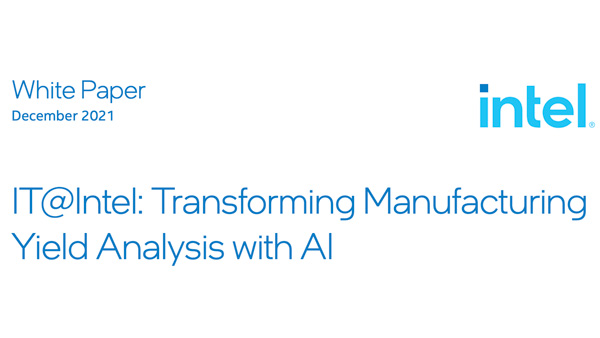IT@Intel: Transforming Manufacturing Yield Analysis with AI

Intel IT is using artificial intelligence (AI) to accelerate yield ramp by clustering and classifying manufacturing failure patterns.
Expert yield analysis engineers have always performed end-of-line yield analysis at Intel’s silicon wafer factories (fabs). But as the number of products and volume grow in Intel’s manufacturing environment, a manual detection approach to yield analysis poses several challenges:
- Limited human-hour resources prevent engineers from reviewing and documenting every issue in every wafer in every lot.
- Detection accuracy depends on an engineer’s experience level.
- Knowledge sharing between fabrication sites is cumbersome and slow.
Intel is changing the paradigm of yield analysis from this manual, reactive “pull” approach to a proactive “push” approach, which is helping to find problems such as failing tools, fleet mismatches and process parameter shifts, quickly and accurately. The more quickly such issues are identified, the sooner they get fixed and overall yield is improved.
The solution is characterized by the following:
- Advanced machine-learning and deep-learning algorithms for issue detection, clustering, classification, data gathering and in the future, root cause analysis.
- Autonomous end-to-end detection, where the above tasks are performed automatically and then the results are pushed to the yield analysis engineers for further investigation.
- Tight integration with existing yield analysis tools and systems.
Our unique solution enables end-of-line issue detection to identify multiple issues on the same wafer, and to examine 100 percent of wafers in every lot. The combination of artificial intelligence (AI) and yield analysis engineers’ knowledge enables them to support more products, use knowledge captured collectively across fabs and shorten time to resolution. Overall, this solution is propelling us along our Industry 4.0 journey toward complete automation of the root cause analysis process and better yield.
For more information on Intel IT Best Practices, please visit intel.com/IT
Posted in:
Artificial Intelligence, Intel, Intel IT, IT White Papers, IT@Intel

